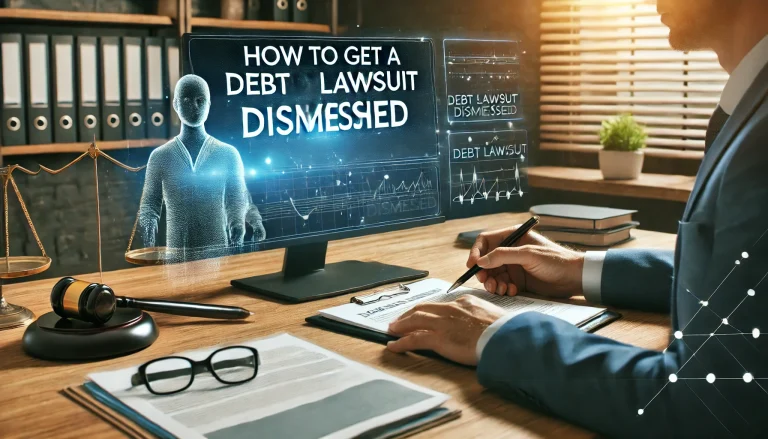Being served with a debt lawsuit can be overwhelming, but understanding how to get a debt lawsuit dismissed can help you defend yourself effectively. Recognizing your rights, understanding the process, and following the proper legal steps are essential for protecting yourself. This article will walk you through the detailed steps involved in getting a debt lawsuit dismissed.
Understanding the Debt Lawsuit Process
A debt lawsuit typically occurs when a creditor or debt collector sues you to recover money that you owe. The creditor may be the original lender, or they may have sold the debt to a collection agency. The creditor will file the lawsuit in an attempt to collect the money, and if you don’t respond or contest the suit, they may win the case by default.
Why It’s Important to Respond
It’s critical not to ignore a debt lawsuit. If you do, the court may issue a default judgment, meaning you’ll be required to pay the debt, and the creditor can take actions like garnishing your wages or placing liens on your property. Even if you believe the debt isn’t valid, responding properly can help prevent this from happening.
How to Get a Debt Lawsuit Dismissed: Proven Strategies to Protect Yourself
If you’re facing a debt lawsuit, don’t panic. You have legal rights and options to defend yourself, and in some cases, you can get the lawsuit dismissed entirely. Creditors must follow strict legal procedures when filing a lawsuit, and any errors on their part can work in your favor. Start by carefully reviewing the lawsuit and responding promptly.
Ignoring it can lead to a default judgment, which allows the creditor to collect the debt through wage garnishment or other means. Next, verify the creditor’s claim by requesting proof that you owe the debt and that they have the legal right to sue you. Creditors must provide valid documentation, such as the original loan agreement and a detailed payment history.
Additionally, check whether the statute of limitations has expired, as debts past this time frame cannot be legally enforced. If the creditor fails to follow legal procedures or provide sufficient evidence, you can file a motion to dismiss the case. By acting quickly and understanding your rights, you can increase your chances of having the debt lawsuit dismissed.
Review the Lawsuit Details Carefully
The first step after receiving a debt lawsuit is to thoroughly review the lawsuit documents. Check the details carefully to ensure they are accurate. Key things to look for include:
- Who is suing you: Verify the identity of the plaintiff. This could be the original creditor (the person or company you owe money to) or a third-party collection agency that purchased the debt. If the plaintiff is not the original creditor, they must prove they own the debt and have the legal right to sue you.
- Amount owed: Ensure that the amount the creditor is claiming is accurate. Sometimes the plaintiff may include interest, fees, or charges that aren’t valid or are incorrectly calculated.
- Jurisdiction: The lawsuit must be filed in the proper court jurisdiction. This is usually the area where you live or where the contract was signed. If the lawsuit is filed in the wrong jurisdiction, you can request that the case be moved or dismissed.
- Proper service: The plaintiff must serve you with the lawsuit papers properly. If they fail to do so (i.e., you didn’t receive the paperwork correctly), you might be able to request a dismissal based on improper service.
Identify Grounds for Dismissal
There are several common reasons why a debt lawsuit can be dismissed. Recognizing these reasons is key to challenging the lawsuit effectively:
Improper Service
When a lawsuit is filed, the plaintiff must notify you (the defendant) properly, usually by having someone deliver the legal documents to you personally or by mail. If the plaintiff fails to serve you properly, the court may dismiss the case. You can file a motion to dismiss based on improper service.
Lack of Standing
The plaintiff must prove that they have the legal right to bring the lawsuit. If the debt has been sold to a collection agency, they must show that they are the rightful owner of the debt and that they have the authority to sue. If they can’t prove this, you can ask the court to dismiss the case.
Statute of Limitations
Every type of debt has a statute of limitations, which is the time frame during which a creditor can legally sue you to collect the debt. If the creditor waits too long (usually 3-6 years depending on the type of debt and your state), the lawsuit may be dismissed. Check the date of the last activity on the debt to determine if it’s too old to be collected.
Failure to Provide Evidence
The plaintiff must provide proof that you owe the debt. This typically includes the original contract, payment history, and any agreements related to the debt. If the plaintiff cannot produce this evidence, you can request the case be dismissed on the grounds of insufficient proof.
Inaccurate Claims
Sometimes, creditors make mistakes, such as incorrectly stating the amount you owe or even suing the wrong person. If there are inaccuracies in the lawsuit, you can request that the case be dismissed.
Respond to the Lawsuit
Once you receive a debt lawsuit, it’s essential to respond in writing by filing an Answer with the court. Your answer will detail your response to the claims made by the creditor. You’ll need to:
- Deny or admit the claims: If you dispute the debt, you should deny the claims and explain why. For example, you may dispute the amount or argue that you don’t owe the debt.
- Raise affirmative defenses: These are legal reasons that may excuse or invalidate the debt, such as the statute of limitations having expired, or the creditor failing to prove they own the debt.
- File your answer on time: Courts have strict timelines for filing responses, usually 20-30 days after receiving the lawsuit. Failing to respond on time can lead to a default judgment against you.
Request Evidence
To support your defense and strengthen your case, you can ask the plaintiff to provide evidence of the debt. This is known as discovery, and it typically includes a Request for Production of Documents. You can ask the creditor to supply:
- The original loan agreement or contract.
- Documentation proving you owe the debt (such as payment history).
- Proof that the creditor owns the debt if it’s been transferred or sold to a third party.
If the creditor fails to provide sufficient evidence or documents, you can file a motion to dismiss the case based on their failure to meet the burden of proof.
File a Motion to Dismiss
If you believe the case should be dismissed for valid reasons (such as improper service, lack of standing, or failure to provide evidence), you can file a Motion to Dismiss. This motion asks the court to terminate the case without going to trial.
The motion should clearly state why the case should be dismissed, citing legal grounds like:
- Improper service of process.
- Lack of jurisdiction.
- The statute of limitations has expired.
- The plaintiff’s failure to prove ownership of the debt.
Prepare for Court
If your motion to dismiss is denied or the case proceeds despite your challenges, you’ll need to prepare for a court hearing. Gather all your evidence, including:
- Proof of any payments you made to the creditor.
- Correspondence with the creditor or collection agency.
- Documentation challenging the plaintiff’s claims (such as proof that the debt is too old or that the creditor doesn’t own the debt).
At the hearing, you’ll need to present your case in a clear, factual manner. Be ready to answer questions from the judge or the creditor’s attorney and stay calm throughout the process.
Negotiate a Settlement (Optional)
If a dismissal doesn’t seem likely, consider negotiating with the creditor. Many creditors are willing to settle the debt for a reduced amount or set up a payment plan. A settlement can help avoid a judgment, wage garnishment, or other legal consequences.
If you reach a settlement, make sure it’s documented in writing, and request that the creditor dismiss the lawsuit once the settlement terms are met.
Consider Hiring Legal Representation
While it’s possible to handle a debt lawsuit on your own, hiring an attorney can increase your chances of success, especially if the case is complex. A debt defense lawyer can:
- Review your case and advise you on the best course of action.
- Help you draft motions and responses to the lawsuit.
- Represent you in court and negotiate on your behalf.
Hiring a lawyer may require some upfront costs, but it can be well worth it in the long run, especially if the lawsuit involves large amounts of money.
Final Steps
If the case is dismissed, make sure it’s properly recorded in the court’s records. If the court rules against you and doesn’t dismiss the case, consider appealing the decision or continuing to negotiate a settlement.
Conclusion
Knowing how to get a debt lawsuit dismissed is crucial for protecting your rights and avoiding unnecessary financial stress. While it requires attention to detail, timely action, and a clear understanding of legal procedures, the steps outlined in this article can significantly increase your chances of success. Whether through dismissal or a favorable resolution, being proactive and informed is key. If needed, don’t hesitate to seek legal assistance to guide you through the process.
FAQs
Can I get a debt lawsuit dismissed if the creditor doesn’t prove the debt?
Yes, if the creditor fails to provide valid evidence like contracts or payment history, you can request dismissal.
What happens if the statute of limitations has expired on my debt?
If the debt is time-barred, you can file a motion to dismiss based on the expired statute of limitations.
Can I file a motion to dismiss if I wasn’t served properly?
Yes, improper service is grounds for dismissal, as it violates your legal right to be notified.
Do I need a lawyer to get a debt lawsuit dismissed?
Not always, but a lawyer can increase your chances by spotting legal flaws and drafting strong motions.
Can I settle the debt and still have the lawsuit dismissed?
Yes, creditors often agree to dismiss the case if you settle the debt or reach a payment agreement.
Article Recommendations
ATT Data Breach 2024 Lawsuit: How Millions of Customers Were Affected and What’s Next
Lifewave Lawsuit: How the Case is Reshaping Wellness Industry Standards
Arias Agencies Lawsuit: Financial Ramifications and Lessons for Businesses
Smoothstack Lawsuit: Examining the Allegations and Their Impact on Tech Employment Practices





